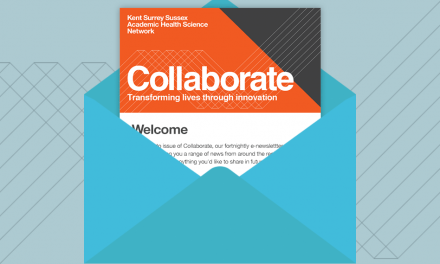Kent Surrey Sussex AHSN (KSS AHSN) recently supported a visiting healthcare innovator delegation from Australia. Nuala Foley, Associate Director Commercial and Enterprise at KSS AHSN, shared her insights with the delegation and wrote this blog reflecting on innovation in the UK health and care sector which was originally published in the Royal Australasian College of Medical Administrators quarterly journal.
This year the UK marked 75 years of the birth of the NHS. Despite the challenges that the NHS faces as it recovers from the Covid backload, ageing population and funding, it is a timely reminder of the innovative concept that was brought to fruition all of those years ago.
This was the starting point for innovation – which is in essence a new method or idea. It is more than improving the status quo – it is about being novel, and 75 years ago that’s exactly what the NHS was.
Move forward to 2023 and we have a much more complex demand. The NHS is much more than treatment of the sick, it is also about prevention, education and caring for an elderly population which is growing. There is a heightened lens on health inequalities, on treating the population of the UK equally and on seeing out solutions that will support this. There is a greater awareness of the interconnection between health and wealth and the importance of living life well – not just longer. There is a driving focus on sustainability and on meeting net zero aspirations. To do all this, Innovation has had to be at the front and centre of the thinking in healthcare in the UK – we can’t and won’t achieve what we want to do with more of the same thinking.
Transform lives through innovation
Academic Health Science Networks (AHSNs) are supporting the desire to “Transform lives through Innovation”. Their role is in the space of supporting proof of value, adoption and in the spread of well-evidenced innovations. This is done through various programmes of work of differing project lengths. Some of these are mandated programmes and others more localized tailored support programmes reflecting that the local needs can differ due to geography, affluence, demographics of the residents etc. For all of these we seek to identify innovations, support in their development, deliver real world validation and then spread the well-evidenced innovations.
The innovation space can be noisy, it can be competitive (I like competition), and it can at times be fickle jumping from a new splashy media headline to another. So, to manage that it is vital to always understand the value proposition around any innovation coming into the UK or being introduced to a health care setting within the UK. Without this it can become too ‘busy’, and the best doesn’t always get to the top of the pile. The diagram below outlines our innovation exchange process to support this value proposition process and to accelerate the speed at which the innovations that will make a difference are adopted and spread.

Before, during and after Covid
I have worked in innovation and with industry for many years, with the more recent ones being in health care. I think of the innovation space in health care (like many do) as the before, during and after Covid. The before feeling like it was ‘push’, the during feeling it was ‘pull’ and the after feeling like time to take a stock check on what worked well and what didn’t. Now is the time for that and we have so much more in the UK to base our stock check on and with that an appetite to really take on innovative solutions and to work with industry to co-design to meet needs.
When does innovation stop being innovation? At times over the last 18 months this is a question I have asked myself as the innovations that were taken on in the early stages of Covid such as remote monitoring tools, and the use of them in virtual wards and step down care, have become more and more available. A new feature is to me no longer innovation – it is improvement to something that began life as an innovative tool. So, to me the challenge for the innovation landscape in the UK is to not stand still. We need to keep building on cultural shift of the last three years and to keep connecting research, to development of innovations, to spread of innovations. We can’t stand still either here in the UK or around the world.
Year on year the world feels smaller and to me this is good – we need to work together and learn from each other and keep on moving.





